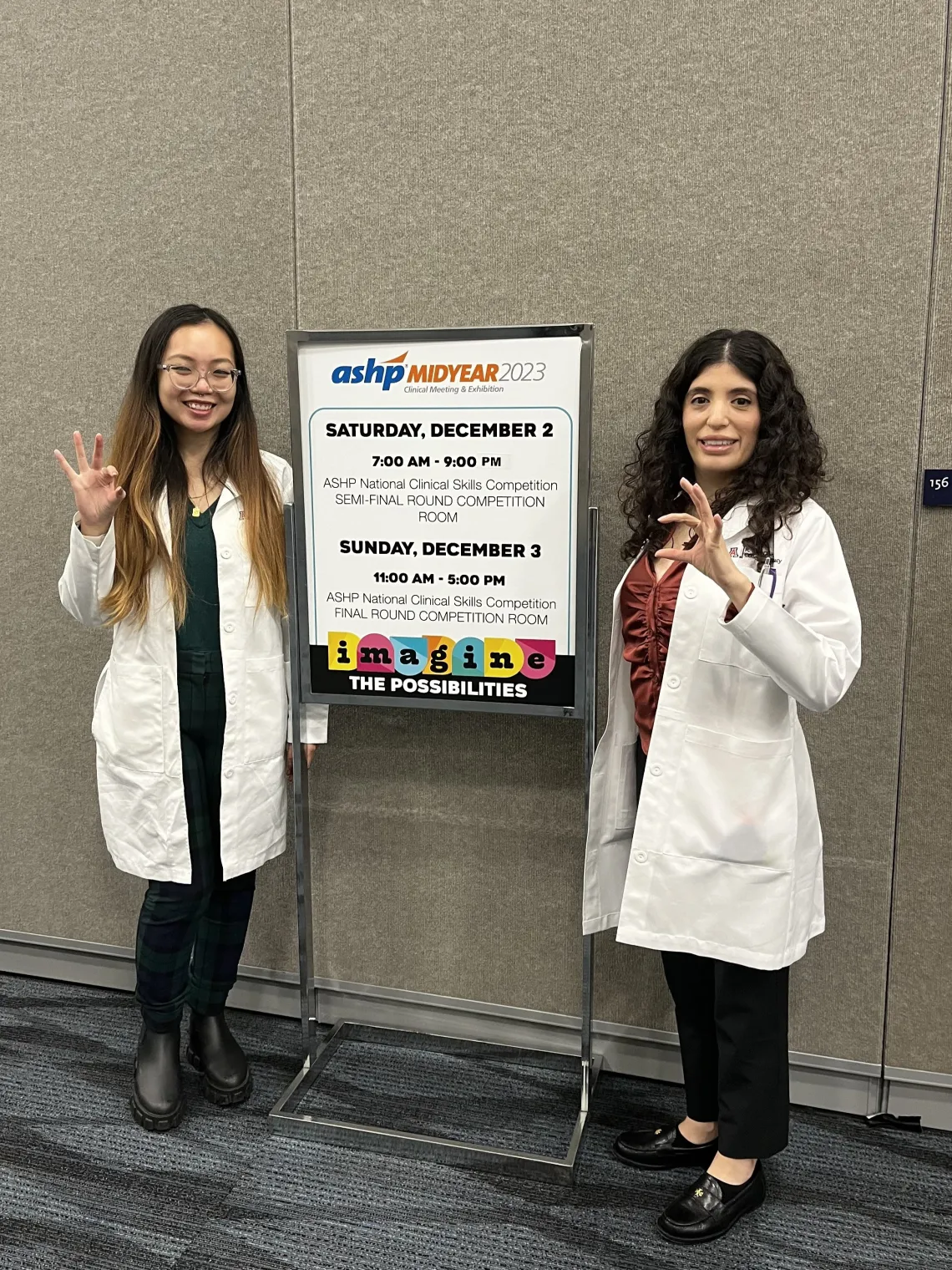PharmCATS represent RKCCOP during national competition

Fourth-year pharmacy students Mariah Duran and Sarah Phan participated in the American Society of Health System Pharmacists (ASHP) National Clinical Skills Competition during the 2023 ASHP Midyear Conference in Anaheim.
Although they didn’t advance to the finals, Duran and Phan gained valuable experience around collaboration, adapting quickly to changing situations, and taking advantage of opportunities.
Why did you participate in the ASHP National Clinical Skills Competition?
Mariah Duran: I was inspired to go into clinical pharmacy after completing my rotation at Evernorth Care. I am passionate about tailoring patient’s medications based on their comorbidities, lifestyle, and their unique values. Participating in the ASHP National Clinical Skills Competition allowed me to extend this passion to a national stage, where I could apply my skills and connect with like-minded individuals dedicated to exceptional clinical care.
Sarah Phan: Mariah approached me first about participating in the local competition. Initially, I was apprehensive about competing in the local competition, but I am a firm believer in taking any opportunity that comes my way. I figured I would show up and try my best and I was both shocked and elated to find out that we won. Being given the opportunity to compete nationally against students from all over the country and with so many different backgrounds was amazing.
What was it like to compete? Who did what?
MD: The case was challenging because the typical treatment options were contraindicated but that made finding the solution together so rewarding. We competed by playing to our strengths to investigate the different disease states. Trusting each other and communicating well was key to ensuring patient safety and in this competition.
SP: Competing was both nerve-wracking and exhilarating. The complexity of the case really simulated a patient presenting with multiple comorbidities to be managed and emphasized the need to focus on the most detrimental problem first. The patient had a multitude of various disease states so we individually tackled the ones we felt the most comfortable with and went over our plans and ideas with each other. By communicating with each other and trusting each other enough to focus on our own section, we accomplished quite a bit.
How much preparation is involved?
MD: I reviewed the previous national cases as well as the case studies through Access Pharmacy and in the Naplex book for approximately an hour each day. Then under Dr. Katz guidance, Sarah and I meet twice for about 90 minutes to review the cases together.
SP: I spent time each week leading up to the competition practicing with the previous national and local cases for 90 minutes to simulate the actual competition the best I could. Mariah and I also met a couple times to do a practice case together which we then had Dr. Katz review. Being up to date on your guidelines and aware of how to find information is one of the most critical keys to preparing as well.
How far did you get in the competition? And what did you learn from the experience?
MD: We advanced to the semifinals and scored above average in the national competition. This experience taught me valuable lessons about inter-professional collaboration and quickly adapt when the original plan needs to be revised.
SP: I am proud to say that we made it to the semifinals of the national competition. Throughout this experience, I learned to trust in my abilities as a future pharmacist and to just try my hardest. The importance of collaboration was also emphasized as well as being able to think quickly while making sure there is data to back up your recommendations.
Would you recommend other students to participate in the competition? Why?
MD: Absolutely, participating allowed us to apply our pharmaceutical knowledge in a practical application at a national level. Beyond academic growth, this is a great place to network and forge connections within the field.
SP: I would absolutely recommend competing in the Clinical Skills Competition. Being initially apprehensive myself, I understand the fear of losing but it's so important to push yourself out of that mindset. By saying yes to opportunities that come your way, you open yourself up to so many wonderful new experiences. It allows you to test the boundaries of your knowledge and apply the information taught in school. It was also motivational to see other students who were also dedicated to doing their best and showing their knowledge.

